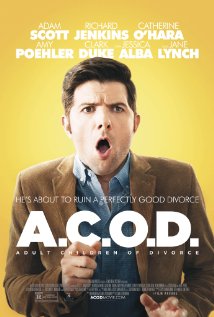
A.C.O.D.
US, 2013, 88 minutes, Colour.
Adam Scott, Richard Jenkins, Catherine O' Hara, Amy Poehler, Mary Elizabeth Winstead, Clark Duke, Ken Howard, Valerie Tian, Jessica Alba, Jane Lynch.
Directed by Stuart Sticherman.
A.C.O.D is an acronym for Adult Children of Divorce. The film works on the premise that the present adult generation has not experienced stable family background, experiencing the effect of their parents’ divorce. During the final credits there are many quick interviews with a range of people, some saying how much the divorce had affected them, others saying that it did not have much effect at all.
While the theme is serious, it is treated with something of a light and comic touch. It has a very strong cast, with such comic actors as Amy Poehler, Jane Lynch, and serious performers who can do comedy as well, Richard Jenkins and Catherine O’ Hara. Adam Scott, Mary Elizabeth Winstead, Jessica Alba represent the younger generation.
Everything is seen from the point of view of Carter, Adam Scott, who was interviewed as a child by a researcher, played by a sardonic Jane Lynch, who then wrote a book about these children, not identifying them. While Carter is bemused by the continued quarrelling of his father and mother, their second marriages, their inability to be in the same place at the same time, he faces a crisis when his younger brother decides to get married and wants them both at the wedding.
Carter has been in a four-year relationship with Lauren, Mary Elizabeth Winstead, but has not found the strength to propose. Her parents have been in a stable relationship, celebrating their anniversary with great gusto every year – the 37th in the film.
Richard Jenkins and Catherine O’ Hara are persuasive and their antagonistic scenes – and then shocking the audience by starting up their relationship again. This has repercussions on their respective spouses, Amy Poehler and Ken Howard.
Carter gets continually more involved, discovers the book reads it, is interviewed further by the researcher, and breaks off his relationship with Lauren.
It builds to a finale at Lake house, everybody turning up and the house guy up in flames. The film is realistic in his portrayal of the troubles of the younger generation – but there is some hope at the end.
1. The title, the acronym? Audience interest? audiences who identified with the characters?
2. A contemporary story, the generation of divorce, different parenting, absence of parenting?
3. The strong cast, character actors?
4. Carter’s story, when a little boy, the films, the pictures, his relationship with Trey, Carter’s care of his brother, the relationship with the parents, divorce, the many clashes, issues of custody, visits, the holiday house, Carter at nine, the trauma, his parents telling the story as about Trey? Therapy, the visits to Dr Judith? The repercussions? Her writing the book?
5. Trey, young, freer than Carter, his girlfriend, Japanese, their love, together, the decision to marry? Telling Carter, the wedding plans, precipitating the crisis with the parents?
6. Hugh, as a father, failure, womaniser, his clashes with Melissa, the arguments? His marriage to Sondra, the children, happy, playing with them, acting like a father? Sondra checking on him, his relationship with each of his sons?
7. Melissa, character, fighting, dominant, the marriage and failure, and the marriage? Both refusing to be in the room with each other?
8. The new spouses, Gary, easy-going, the cheque for Trey, enjoying fishing, going to the house, talking with Carter, the failure of his previous marriages?
9. Sondra, owning the site of the restaurant, Carter disliking her, calling her Cuntessa, the children, going to the reunion, phoning and checking?
10. Carter, his life, growing up and success, the restaurant, running it effectively, the staff, the customers, the lease and Sondra? For years with Lauren, her not having a key, and no proposal, his not telling her about his past, the encounter with Dr Judith, reading the book, identifying Carter as Rick? Her parents, the long marriage, the party, Carter and his tension, kneeling with the proposal, only asking to make it legal? Refusal, separation, coming to the book launch, going to walk, reunited?
11. The scenes with Hugh and Melissa together, the reactions at the table, Carter trying to tell them to behave? The sexual encounter, Carter discovering them? Their lives? Telling Trey, his telling everyone?
12. The Japanese meal, both parents arriving, the behaviour, Carter and his sulking, going out, his parents going out to reprimand him, send him back in?
13. Dr Judith, Carter’s visit to her, the talk, not knowing about the book, the bookshop, reading it, realising he was Rick? (And Lauren identifying him as
Rick? His return to Dr Judith, the arguments, in the street, the client and his discussions with him and realising he was Rick, Carter’s resentment, Michelle, their talking, with the older husband in the bar? His collecting the boxes from the garage? Taking them to Dr Judith, her returning them, the proposal to write the new book, his reaction?
14. Carter as a character, his angers, his parents, intervening, interfering?
15. The wedding, the preparation, the fittings for the suits, his anger, Trey and his reaction, the wedding off?
16. The clash with Sondra, the terminating of the lease?
17. Going to the house, Trey and his girlfriend, Gary and his going fishing, the visits of Hugh and Melissa? Sondra and the children? Carter’s cleaning up, the fire, the cigarette butt, the house going up in flames, the reactions? Carter buying it?
18. Dr Judith and the book launch? Carter there?
19. Happy ending, the wedding, reconciliations, hopes?
20. The final credits and the personal interviews, so many as the adult children of divorce, some not?
21. The tackling of the serious subject through irony, through humour?